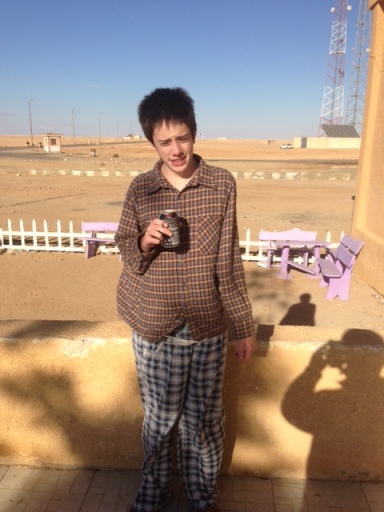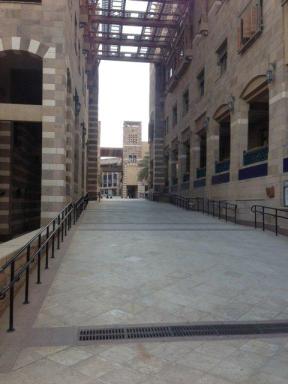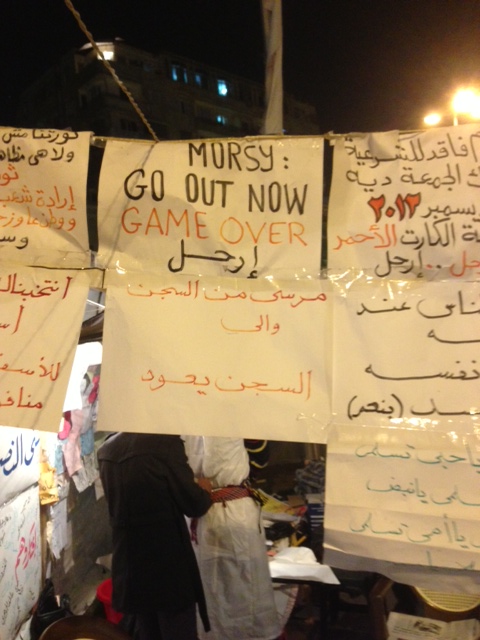It almost did not seem possible, but indeed Egypt has a new constitution. It is no doubt deeply flawed. It fails to protect minority rights, leaves many questions about the role of women, privileges Islam and Shuria law and fails to dislodge the state within a state status of the military. The latter is extremely concerning, as the Minister of Defense will be chosen not by the President but by the military, and there is no true civilian oversight of the military budget.
The 2nd round of voting was held on December 22nd, and we were what seemed like an eternity away from Cairo in the Siwa Oasis, about a 10 hour drive from Cairo, and only 40 kilometers from Libya. Though Cairo and other governates voted the week before, Siwans voted on the 22nd, and our very informal survey of residents suggested overwhelming support for the new constitution. Though our affluent neighborhood of Maadi voted over 60% against the constitution, this was not the case in Siwa. The man selling the freshest, hottest, cheapest, greasiest and best falafel that I have had has told us that everybody in Siwa, “even the children” will vote to support the constitution. Some expressed support simply because they wanted to get this stage of the painful birth of democracy over, others because they truly embraced the thrust of this constitution.
To say that Siwa is conservative does not begin to capture this magical place. Though all Siwians speak Arabic, they also have their own oral language. The culture shares much with Tangiers in Morocco. Nearly all the men wear gallabayas and married women are totally covered, without even the opening for the eyes as the Salafists have. Once married, women rarely leave the home. Much of the building material of the Oasis is mud. There is rubble everywhere, and I am still trying to reconcile Leah’s apt observation that the place looked like it was bombed with our shared observation that it was one of the most beautiful places on earth. Date and olive trees are nearly everywhere and these two crops seem to sustain much of the local economy. Tourism, like everywhere we have visited across this vast land, is down.

Noah stayed up all night before our drive to Siwa, so he wore pajamas the whole way.
Perhaps the biggest adventure of this trip was our night in the Libyan Desert. Accompanied by our intrepid guide Aloush, we left our house in Siwa at about 10 am. He and our host Penny commented that the clouds and wind were incredibly unusual. We set out and had a wonderful ride through the largest sand dunes I had ever seen. We enjoyed lunch overlooking a lake, and then set for a ride through the desert. Because the desert is ever changing, Aloush would climb the dunes and then stop at the top, peering over to make sure the downhill was safe. Imagine a natural roller coaster. Leah and Noah took to sand boarding quickly, though the climb back up the dune was more difficult than we had imagined.

Noah and Leah sand boarding.
After finding shells and sand dollars across the desert floor, the wind continued to pick up as the sun began to set. “This is not a good night for camping,” Aloush shared with me as he gently dropped sand from his hand to measure the wind. In retrospect, I think he was saying maybe we should head back to town. As we unloaded the blankets, mats, sleeping bags and food from his Toyota Land Cruiser, it began to rain, the first time Aloush had seen rain in the desert in his 17 years of taking people camping. We loaded things back in to the car so they would not get wet, he amazingly lit a fire and cooked a delicious chicken stew with potatoes and zucchini. He abandoned the idea of grilling the chicken as he said it would be full of sand. We ate, set up the sleeping bags, and settled in for a most uncomfortable night under the clouds in the midst of swirling sand that I am days later still finding in my ears. Indeed, the sun could not come quickly enough, as we packed up and abandoned the idea of making breakfast as it was bitterly cold and windy. We returned to Siwa village where we showered, shook out the sand, and chalked yet another set of events up to memory.

Leah, Noah and Judy wrap their heads to protect their faces from the blowing wind.

Leah with our guide, chef and protector Aloush
We rented a villa in Siwa, built in the traditional mud style of houses in the village. We cooked breakfast in the morning, and I enjoyed going out early to buy eggs, oranges, hot bread and one morning even strawberries. Donkey carts were ubiquitous, though I was told that increasingly the tuk-tuks we saw were becoming increasingly menacing in the town square. This town was only connected to the rest of Egypt by a road in 1986, and did not have electricity 24 hours a day until the 1990s. The cafes seems to be open early, with men (only men) sipping tea and smoking shisha. A climb to the top of the Shali yielded a wonderful view of the town, the palm trees growing in the Oasis, and the desert dunes just miles beyond. Even though December and the temperatures were mild, when the sun shone brightly I was reminded we were in the desert.

Siwa has an abundance of wonderful historical sites to see, largely empty, no hassles, no tickets, just history. As we began our 10 hour drive back to Cairo, I was reminded that we have over the course of our time here in Egypt and Jordan and Lebanon toured ruins, tombs, pyramids, museums, catacombs, grottos, caves, monuments, mosques, churches, monasteries, synagogues, villages, treasuries, oracles, citadels, libraries and palaces. One cannot help but be reminded of the vast and slow pace of history, of the rise and fall of leaders and religions and beliefs and practices. As we have been witnesses to intense and sometimes violent political debate over these last five months, this backdrop provides at least a temporary reprieve, a reality check if you will on the winds of historical forces. I do not say this to at all lessen the intensity or importance of the Arab Awakening that we have witnessed here over the last five months, not at all. But the historical backdrop that we have seen does make me take pause to think.

A street sign in Siwa
As we drove back in to Cairo last night I noticed that the few protesters who had been in front of the Constitutional Court here in Maadi since November 22 had left their tents. After Morsi’s controversial decree on the 22nd, his supporters gathered here in order to prevent the Court from meeting and threatening the planned constitutional referendum. Though there were initially thousands who blocked the entrance and camped out, I had noticed each time we drove down the Corniche to downtown that the numbers had been dwindling. Now that the vote was over, the last stalwarts had gone home. Egypt has a new constitution. Its place in history will be determined by what the politicians do with it, as is true of all constitutions. And no matter what your view of how good or bad it is, history will no doubt take note of the lively and rancorous and public discussion and debate that has been a constant of our time here, and will I sense be a constant here for some time to come. I cannot help but think that this is a good thing. Not easy, but good. For now at least.










